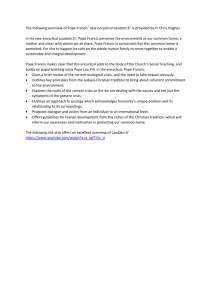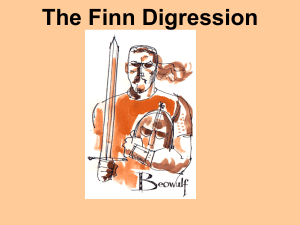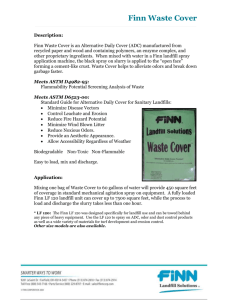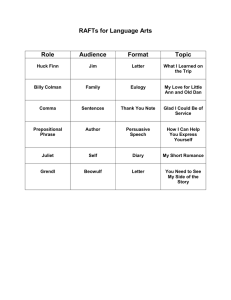Document 11102900
advertisement
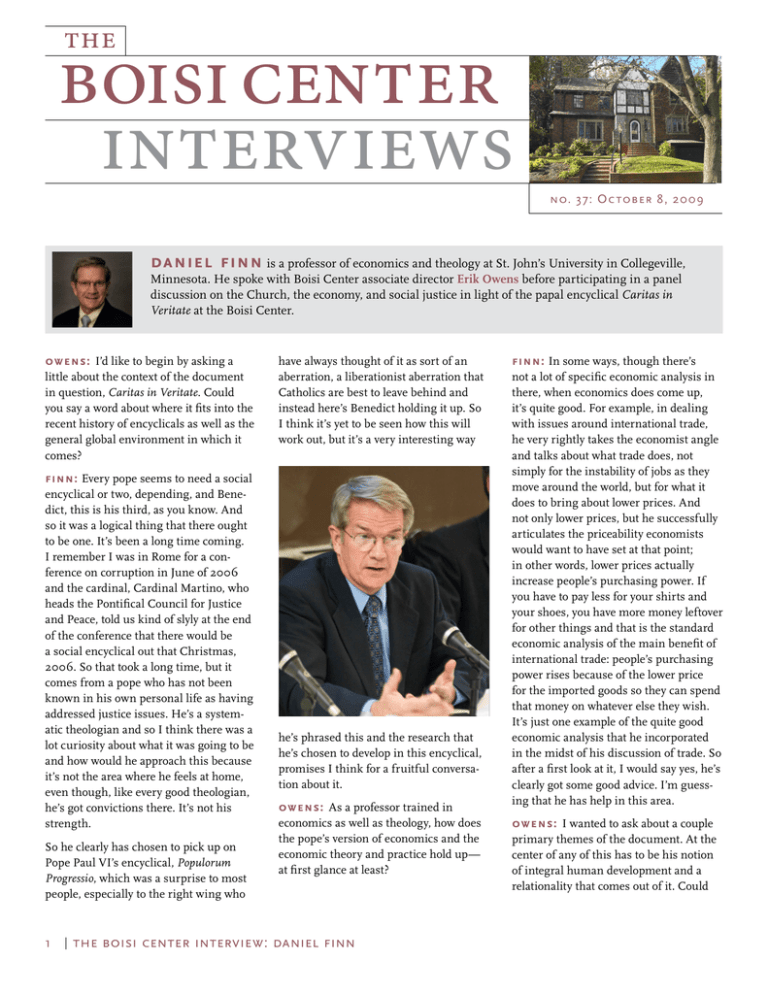
the boisi center interviews no. 37: Oc tober 8, 20 09 daniel finn is a professor of economics and theology at St. John’s University in Collegeville, Minnesota. He spoke with Boisi Center associate director Erik Owens before participating in a panel discussion on the Church, the economy, and social justice in light of the papal encyclical Caritas in Veritate at the Boisi Center. owens: I’d like to begin by asking a little about the context of the document in question, Caritas in Veritate. Could you say a word about where it fits into the recent history of encyclicals as well as the general global environment in which it comes? finn: Every pope seems to need a social encyclical or two, depending, and Benedict, this is his third, as you know. And so it was a logical thing that there ought to be one. It’s been a long time coming. I remember I was in Rome for a conference on corruption in June of 2006 and the cardinal, Cardinal Martino, who heads the Pontifical Council for Justice and Peace, told us kind of slyly at the end of the conference that there would be a social encyclical out that Christmas, 2006. So that took a long time, but it comes from a pope who has not been known in his own personal life as having addressed justice issues. He’s a systematic theologian and so I think there was a lot curiosity about what it was going to be and how would he approach this because it’s not the area where he feels at home, even though, like every good theologian, he’s got convictions there. It’s not his strength. So he clearly has chosen to pick up on Pope Paul VI’s encyclical, Populorum Progressio, which was a surprise to most people, especially to the right wing who 1 have always thought of it as sort of an aberration, a liberationist aberration that Catholics are best to leave behind and instead here’s Benedict holding it up. So I think it’s yet to be seen how this will work out, but it’s a very interesting way he’s phrased this and the research that he’s chosen to develop in this encyclical, promises I think for a fruitful conversation about it. owens: As a professor trained in economics as well as theology, how does the pope’s version of economics and the economic theory and practice hold up— at first glance at least? the boisi center interview: daniel finn finn: In some ways, though there’s not a lot of specific economic analysis in there, when economics does come up, it’s quite good. For example, in dealing with issues around international trade, he very rightly takes the economist angle and talks about what trade does, not simply for the instability of jobs as they move around the world, but for what it does to bring about lower prices. And not only lower prices, but he successfully articulates the priceability economists would want to have set at that point; in other words, lower prices actually increase people’s purchasing power. If you have to pay less for your shirts and your shoes, you have more money leftover for other things and that is the standard economic analysis of the main benefit of international trade: people’s purchasing power rises because of the lower price for the imported goods so they can spend that money on whatever else they wish. It’s just one example of the quite good economic analysis that he incorporated in the midst of his discussion of trade. So after a first look at it, I would say yes, he’s clearly got some good advice. I’m guessing that he has help in this area. owens: I wanted to ask about a couple primary themes of the document. At the center of any of this has to be his notion of integral human development and a relationality that comes out of it. Could you summarize the thrust of his message on this point? finn: Yes. More or less. It’s a quite extended analysis, so I can’t get it all here, but clearly he’s picking up on integral human development as the major theme from Paul’s encyclical, and of course, Populorum Progressio was really focused on the development of people. The question of economic development for poor nations was at the center of that and Popes Paul and Benedict point out very vividly that while there are important economic issues here, we don’t want to reduce this issue of development down to some kind of economic formula for something that even economics can measure easily. So integral human development is the way out of this problem by calling it human development, but it must integrate all aspects of human flourishing, which would include family of one psychological state, equations of status in society, and spiritual questions that, when properly integrated, one could get a proper development. The other piece is the fact that not only are all of these elements involved in integral human development, but their claim is that integral human development is needed in our own lives, rather than being a special case kind of thing based on a fundamental Christian anthropology as to what allows for human flourishing. It’s not just something we desire for the people of Guatemala or Tanzania. owens: He also speaks about the civil economy. Could you elaborate a bit on what he’s after, especially vis-à-vis the current status of market economies? finn: Right. Well, I’ll be talking more about this this afternoon. The notion of civil economy seems to have come from the Bologna School of thought on these things and a key feature, a key figure in all of this, is the economist, Stefano Zamagni, who has of course been in Bologna for all of his career. He has also been a consulter with the Pontifical Council for Justice and Peace and was involved on the committees that were helping to 2 help advise the Pope on this sort of thing; therefore, my presumption is that the Pope found himself persuaded by these arguments to try to integrate Catholic social thought and economic life through this Bologna School and their argument on civil economy. One can’t be sure if the Pope buys into more than he’s said so far in this encyclical, but their argument is that we currently have a form of economic market that we didn’t use to have, and that modern economic markets began or “We’ve had a version of markets that, while they’ve produced wealth ver y well, tend to undermine human life in other ways. A civil economy would tr y to recover a lot of that .” their predecessor began in the fourteenth or fifteenth century. Zamagni himself points to Franciscans in the fourteenth, fifteenth century as inventing the first banks, the first corporations, and developing a market in a way that they could do. Since their attitude about wealth and property was to put it aside, they could then think very creatively about how one should organize these things and for a couple hundred years, there was something that historians have come to call “civil humanism” or “civic humanism” in the various city-states of the boisi center interview: daniel finn Italy. This flourishing of their version of economic life was eventually overtaken, marginalized and even eliminated by the politics of the modern world, the Machiavellis and the Hobbeses of the world who argued for a different model for understanding how society should be organized. So what Zamagni is arguing and how I understand it is referring to this conviction that for the last 300 years, we’ve had a version of markets that, while they’ve produced wealth very well, tend to undermine human life in other ways. A civil economy would try to recover a lot of that while holding onto the wealth producing capacity of the economy. owens: So it’s civil in the sense of being civilized as well as non-state driven, right? finn: Exactly. That’s very well said. Civil society is involved in this and yet, as the Pope’s encyclical points out, there are what he calls these “hybrid economic organizations” which are firms in the sense that they’re making a profit. We can compare them to other firms, but they are also dedicated to the common good in the sense that they dedicate those profits not just to the well being of those who own the firm, but also to some larger public purpose. They’re civilizing as well as an example of civil society, just as you said. owens: The document itself seems to be a running commentary on civic engagement and the role of the person in society. Do you see anything new here in terms of the theology of public life—a mode or a theological justification for engagement at different levels of society that’s noteworthy or different than his predecessors’ views? finn: Well, I think perhaps. Certainly more than the earlier Popes, but even more than I think Pope John Paul likely adhered to this sense of a vibrant engagement of persons, even to talk about democratizing the economy, but certainly democratizing the democracy. The insistence that civil society groups are politically engaged, and by that I think he means not just in the national politics, the electoral politics, but also in the development and building up of society. This way, it isn’t just do-gooders who are out there trying to build new playground equipment over here for the kids, but rather that the very structure of society should be enlivened by this sort of civic engagement. These institutions of civil society, I think, get a better play here of more importance. The other place it comes up is in his rejection of what he called at one point the hegenity of the economy/state/ bi-polar presumption of so many people. What’s going on in the world? Well, there’s the economy and then there’s the state that regulates it, and that’s what’s going on. He said, no, let’s keep in mind that there is this third part of life. He didn’t want to identify at all with the third sector, as the French refer to it as or the nonprofit sector as we call it. He certainly wants to talk about the importance of this as a kind of independent force in the development of society. owens: He also appears to be a tethering together social justice, issues of sexual reproduction, biomedical research, ethical issues, and environmental dangers into a consistent package here. How would you characterize that process in this document? finn: Well, in one way, one might criticize the Pope for trying to put too many different themes into one document and in some places, you see it. All of the sudden, new themes come in that you wonder where is the organization of this? On the other hand, what it does do is to insist that all of these moral themes are related to each other and to a fundamental Christian anthropology. What makes for human flourishing includes everything from spirituality to daily work. So I think he is striving for that and that does seem very clear. Morally speaking, he doesn’t want to divide up social ethics and personal ethics (some- 3 thing we in ethics often do). He doesn’t use those terms for those two areas, but we recognize they are artificial boundaries used for simplicity. There is in fact is an underlying connection, and I suppose in one sense, there’s a dominant, maybe secular inclination to divide things up in a way to forget certain pieces. I think he’s trying to bring them all together so we don’t forget any piece of it. The whole thing. And that—well, he doesn’t use the phrase, but we can certainly hear that echo here from an American point of view. to. Yet, even there, if you ask where in the document would you go to find him describing civil economy, there are three different sections where and in essence, it’s not user friendly. You’ve got to hang in there to get the whole picture. So I think that will hurts its relevance, and yet when you ask even about the most influential of Catholic encyclicals, how many people actually do read them literally? How many get them secondhand from people who are interpreting them and articulating them in ways that are more accessible to others? owens: What kind of impact do you think it has the potential to have, not just within Catholic communities, but the traditional people of good will around the world? How important do you see this document being in the coming years? So I think that will clearly happen. I think even on some of these social ethical topics as we might call them, considering Benedict’s credibility as a systematic theologian and the fact that he’s been known as a theological conservative on lots of other scales will mean that there will be a greater necessity to wrestle with this because the people who have been most disappointed in this have been the right wing Catholics. In fact, it seems that secular people have not had a problem with this document very much. There was a very nice analysis of it, I think in the New Republic online, which published a long essay on it that was praiseworthy, certainly critical at points, but certainly engaging of the argument, including specifically the Christian analysis in the argument. finn: That’s a hard one because in some ways, the document is not as well written as his other two documents. I think it’s not as well organized nor as well written in other ways, yet I think it’s more accessible in that it’s engaging issues that more people out there in the world already are engaging. Thus the topics he addresses (and I think in some of the ways he’s done that, in particular this stressing of civil economy) may be a way for people to access Catholic social thought who might not otherwise be able the boisi center interview: daniel finn It’s hard to say how influential it will be, but I think, particularly given the current economic crisis, the materials that he’s brought forth to think about economic life have a kind of impact today. Had he published this around Christmas of 2006 or even any time before the crisis began, there would have been a lot less interest in this kind of rethinking of the economy than of course there is now. I think that also contributes to its potential for having some kind of real impact on economic life. [end] The Boisi Center for Religion and American Public Life Boston College 2 4 Quinc y Road Chestnut Hill, MA 02 467 tel 617 - 55 2-1860 f a x 617 - 55 2-1863 publife@b c .e du Visit bc .e du/boisi-resources for a complete set of the Boisi Center Inter views and audio, video, photographs, and transcripts from our events. 4 the boisi center interview: daniel finn b oisicenter @b oisi _ center


